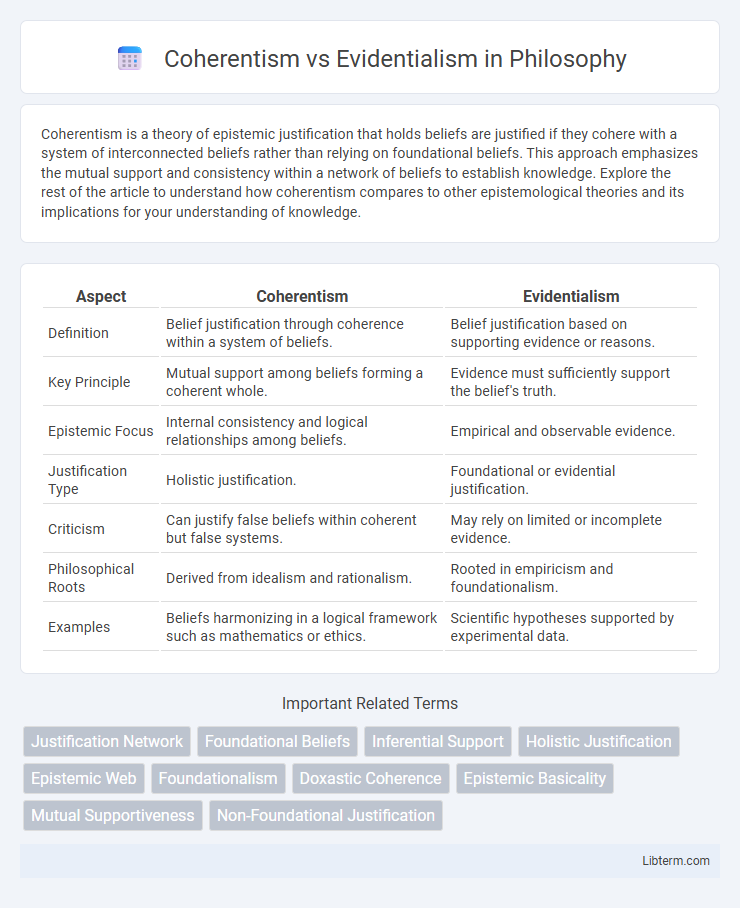Coherentism is a theory of epistemic justification that holds beliefs are justified if they cohere with a system of interconnected beliefs rather than relying on foundational beliefs. This approach emphasizes the mutual support and consistency within a network of beliefs to establish knowledge. Explore the rest of the article to understand how coherentism compares to other epistemological theories and its implications for your understanding of knowledge.
Table of Comparison
| Aspect | Coherentism | Evidentialism |
|---|---|---|
| Definition | Belief justification through coherence within a system of beliefs. | Belief justification based on supporting evidence or reasons. |
| Key Principle | Mutual support among beliefs forming a coherent whole. | Evidence must sufficiently support the belief's truth. |
| Epistemic Focus | Internal consistency and logical relationships among beliefs. | Empirical and observable evidence. |
| Justification Type | Holistic justification. | Foundational or evidential justification. |
| Criticism | Can justify false beliefs within coherent but false systems. | May rely on limited or incomplete evidence. |
| Philosophical Roots | Derived from idealism and rationalism. | Rooted in empiricism and foundationalism. |
| Examples | Beliefs harmonizing in a logical framework such as mathematics or ethics. | Scientific hypotheses supported by experimental data. |
Understanding Coherentism: An Overview
Coherentism emphasizes that beliefs are justified through their coherence within an interconnected web of beliefs rather than relying on foundational evidence. This approach argues that a belief gains justification by fitting consistently and supportively with other beliefs, forming a coherent system. Coherence is measured by factors such as logical consistency, explanatory power, and mutual support among beliefs, distinguishing it from Evidentialism's focus on empirical evidence.
Fundamental Principles of Evidentialism
Evidentialism asserts that beliefs should be formed and sustained exclusively based on evidence that directly supports them, emphasizing the necessity of empirical justification for knowledge claims. This principle mandates that the epistemic justification of a belief depends entirely on the quality and quantity of evidence available, rather than on its coherence with other beliefs as emphasized in coherentism. Fundamental to evidentialism is the requirement that each belief's justification be independent and grounded in objective, confirmable data rather than the interconnectedness of the belief system.
Historical Origins and Development
Coherentism originated from early 20th-century philosophers like Otto Neurath and Laurence BonJour, emphasizing the interrelatedness of beliefs forming a coherence system rather than relying on foundational beliefs. Evidentialism, tracing back to philosophers such as W.K. Clifford and later championed by Richard Feldman, asserts that beliefs must be supported by sufficient evidence to be justified. The historical development of coherentism and evidentialism reflects contrasting epistemological views on justification, with coherentism prioritizing systemic support among beliefs and evidentialism demanding empirical or logical evidence for individual beliefs.
Key Philosophers and Theoretical Contributions
Coherentism, championed by philosophers like Laurence BonJour and Keith Lehrer, emphasizes the consistency and mutual support among beliefs as the foundation of justification, contrasting with Evidentialism, associated with thinkers such as William Clifford and Richard Foley, which insists that justification depends on empirical evidence or probabilistic support. BonJour's coherence theory highlights the systematic integration of beliefs within a web of mutual reinforcement, whereas Clifford's evidentialism underscores the ethical imperative of holding beliefs only on sufficient evidence. These theoretical contributions frame ongoing debates in epistemology regarding the sources and structure of knowledge justification.
Comparing Theoretical Foundations
Coherentism bases justification on the mutual support and consistency among a set of beliefs, emphasizing an interconnected web without requiring foundational beliefs. Evidentialism, in contrast, asserts that beliefs are justified solely on the strength and quality of evidence directly supporting them. Theoretical foundations of coherentism prioritize systemic harmony, while evidentialism emphasizes empirical substantiation through observable data.
Coherentism: Strengths and Weaknesses
Coherentism asserts that beliefs are justified through their coherence within an entire system, emphasizing the interconnectedness of ideas rather than isolated evidence. Its strength lies in addressing the holistic nature of knowledge, allowing flexibility in integrating new information without relying on foundational beliefs. However, its weakness includes vulnerability to circular reasoning and challenges in distinguishing among competing coherent but potentially false belief systems.
Evidentialism: Strengths and Weaknesses
Evidentialism emphasizes that beliefs should be formed based on evidence, ensuring rational justification through empirical or logical support. This approach strengthens epistemic reliability by grounding beliefs in observable data, making it a robust framework for scientific inquiry and critical thinking. However, evidentialism faces challenges in dealing with incomplete evidence and the subjective interpretation of data, which can limit its applicability in complex or ambiguous contexts.
Practical Implications in Epistemology
Coherentism emphasizes the interconnectedness of beliefs, suggesting that practical decision-making relies on the overall consistency within a belief system rather than isolated evidence. Evidentialism prioritizes the quality and quantity of evidence for each belief, impacting practical actions by requiring decisions to be grounded directly in empirical support. In epistemology, coherentism may promote flexibility in belief revision, while evidentialism demands rigorous evidence evaluation to guide justified practical reasoning.
Contemporary Debates and Criticisms
Contemporary debates in epistemology highlight coherentism's emphasis on the internal consistency of beliefs within a belief system, contrasting with evidentialism's focus on empirical evidence as the sole justification for knowledge claims. Critics argue coherentism faces challenges related to the potential circularity of justification and the problem of alternative coherent but false belief systems, while evidentialism is often criticized for its strict evidential requirements that may dismiss justified beliefs formed through non-evidential means. Current discussions explore hybrid theories attempting to reconcile evidence-based justification with coherence constraints to address these criticisms.
Conclusion: Bridging Coherentism and Evidentialism
Coherentism and evidentialism differ in how they justify beliefs: coherentism emphasizes the mutual support of beliefs within a system, while evidentialism prioritizes empirical evidence. Bridging these theories involves recognizing that coherent systems can guide the interpretation of evidence, creating a dynamic interplay where evidence informs coherence and coherence contextualizes evidence. This integration fosters a more robust epistemic framework that balances system-wide consistency with empirical validation.
Coherentism Infographic

 libterm.com
libterm.com